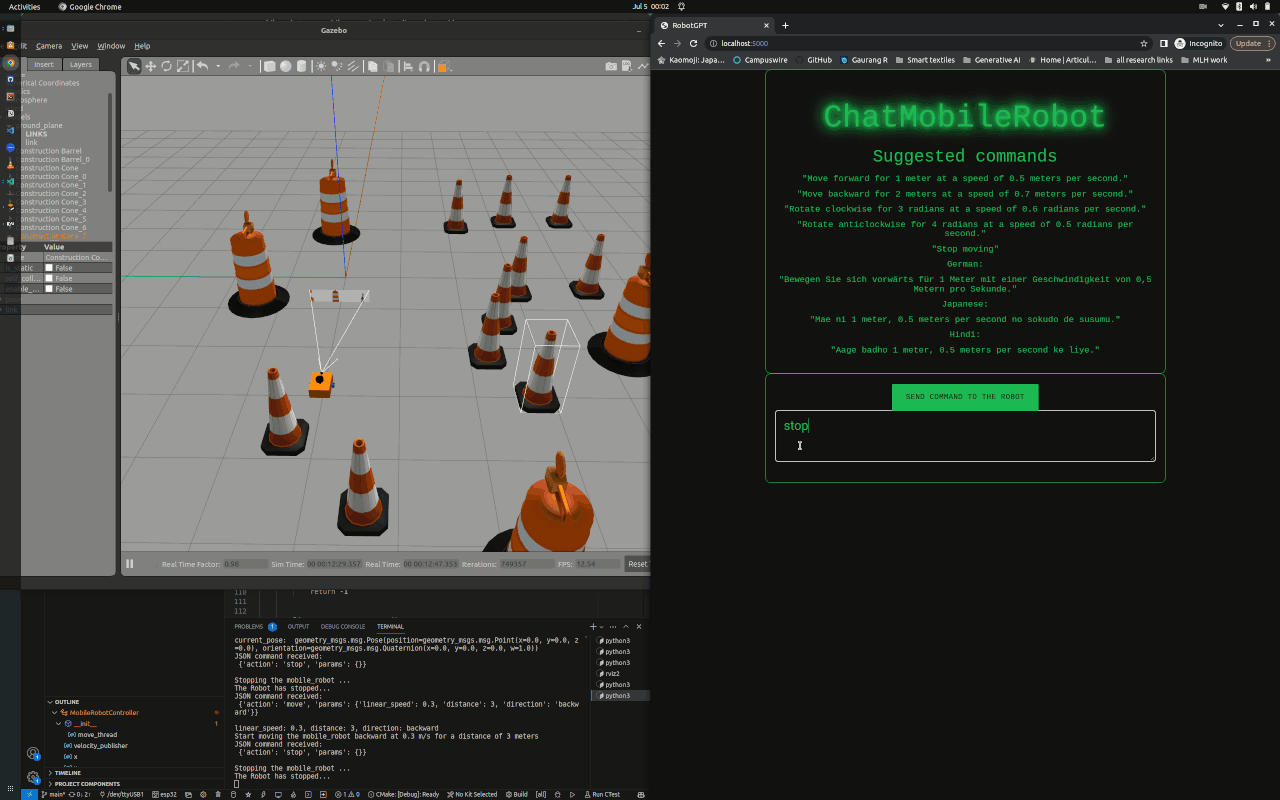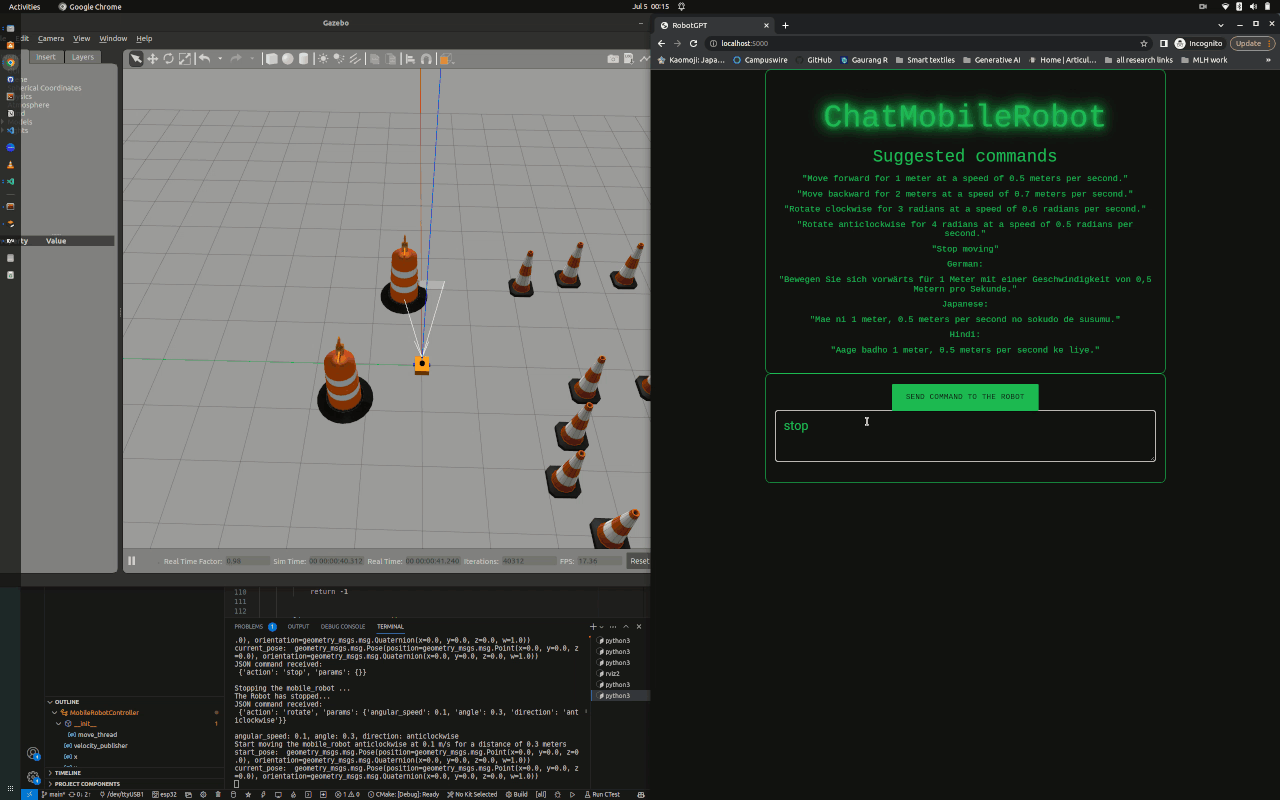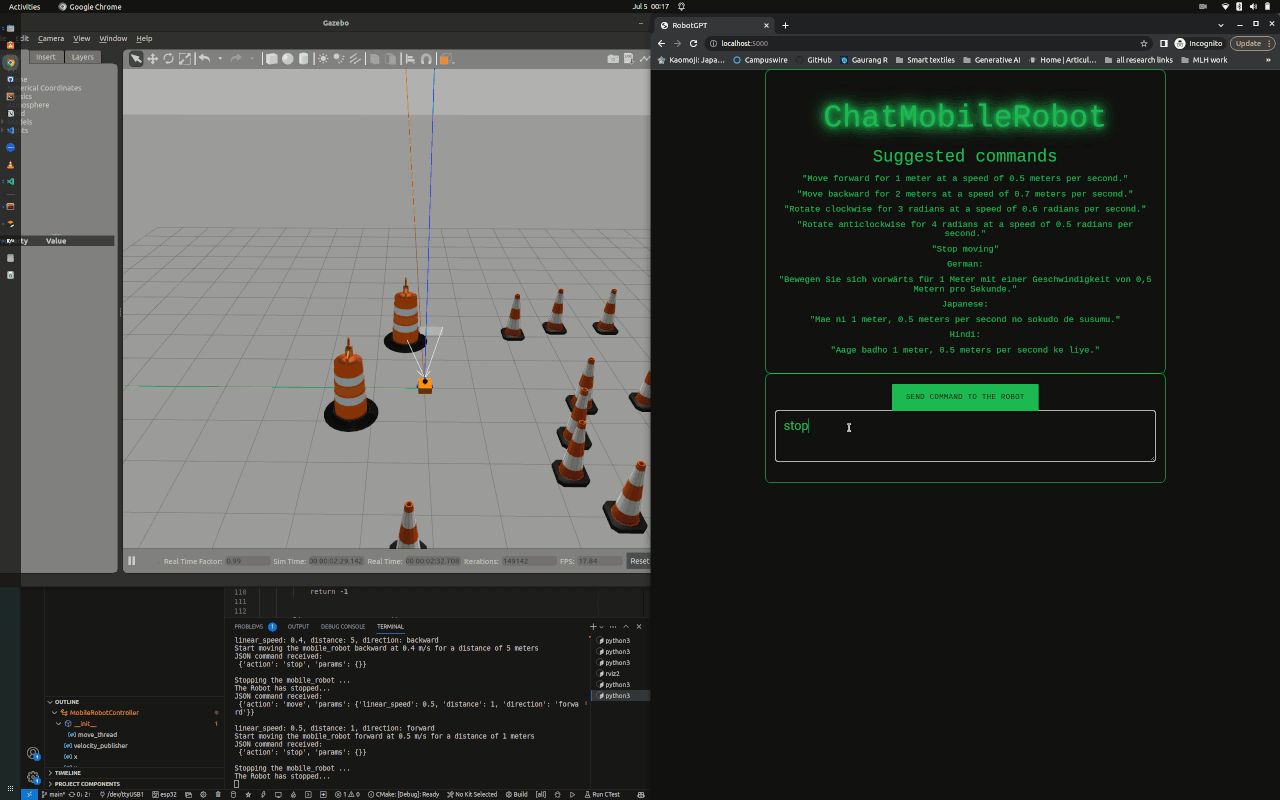https://github.com/gaurang-1402/chatmobile
🛒 Mobile robot controlled by natural language
https://github.com/gaurang-1402/chatmobile
gazebo gpt-3 ros2-humble
Last synced: 3 months ago
JSON representation
🛒 Mobile robot controlled by natural language
- Host: GitHub
- URL: https://github.com/gaurang-1402/chatmobile
- Owner: Gaurang-1402
- Created: 2023-07-02T01:33:28.000Z (almost 2 years ago)
- Default Branch: main
- Last Pushed: 2023-07-06T03:37:12.000Z (almost 2 years ago)
- Last Synced: 2024-12-25T14:43:01.669Z (5 months ago)
- Topics: gazebo, gpt-3, ros2-humble
- Language: Python
- Homepage:
- Size: 151 KB
- Stars: 3
- Watchers: 1
- Forks: 1
- Open Issues: 0
-
Metadata Files:
- Readme: README.md
Awesome Lists containing this project
README
# ChatMobile: Control Mobile Robot with Natural Language
ChatMobile is a project that merges Language Logic Models (LLMs) with the control of mobile robots. With it, users can operate mobile robots using simple, natural language commands. The project is built using ROS2 (Robot Operating System) Humble, and its simulations run within the Gazebo environment, providing a realistic platform for mobile robot behavior.
Accompanying ChatMobile is a user-centric web application that presents users with a straightforward interface to input their commands. This melding of advanced technology and a user-friendly design creates an accessible and intuitive experience for controlling mobile robots.
While ChatMobile currently functions within a simulated environment for thorough testing and development, it is designed with real-world applications in mind. The system can translate natural language instructions into actual robotic commands when required.
Key features include:
- A user-friendly web application that provides an interactive interface for mobile robot control
[](https://postimg.cc/nCRRB8NR)
- Full control over the mobile robot's directional movement, including forward, backward, left, and right commands
[](https://postimg.cc/XGLcWdbH)
- Support for commands in multiple languages
[](https://postimg.cc/87bCtHB0)
## ROSGPT Architecture

1. The first component, "rosgpt.py", serves as the primary translator. As a REST server in a ROS2 node, it receives instructions in the form of POST requests, then processes these instructions into structured JSON commands using the ChatGPT API. Once the translation is complete, the commands are published on the /voice_cmd topic, ready for the next stage.
2. The next component is "rosgpt_client_node.py", a ROS2 client node that acts as a liaison between the user and rosgpt.py. It sends POST requests with the user's commands to the ROSGPT REST server and awaits the transformed JSON commands, displaying them upon receipt.
3. Another key component is "rosgpt_client.py", which fulfills a similar role to rosgpt_client_node.py. The main difference is that this script functions solely as a REST client for ROSGPT, without the ROS2 node involvement.
4. Once the commands are translated, they are received by "rosgptparser_mobile_robot.py". This script, dubbed the ROSGPTParser, executes the commands. It subscribes to the /voice_cmd topic, receives the JSON commands, parses them, and then carries out the necessary mobile robot steering.
## Getting started
Clone the repository
```
mkdir ros_ws
cd ros_ws
git clone
```
Install rosgpt libraries from the rosgpt folder
```
cd ~/src/rosgpt
pip3 install -r requirements.txt
```
Install ROS requirements
```
sudo apt-get install python-rosdep
sudo rosdep init
rosdep update
```
```
cd ~/ros_ws
rosdep install --from-paths src --ignore-src --rosdistro= -y
```
Add your OpenAI API Key in your ```.bashrc``` as an environment variable
```
echo 'export OPENAI_API_KEY=your_api_key' >> ~/.bashrc
```
## Running ROSGPT
First, navigate to the root directory of your workspace and build the project
```
cd ~/ros_ws
colcon build --symlink-install
```
Now run each of these commands on new terminals
```
source install/setup.sh
ros2 run rosgpt rosgpt
```
```
source install/setup.sh
ros2 run rosgpt rosgpt_client_node
```
```
source install/setup.sh
ros2 run rosgpt rosgptparser_mobile_robot
```
## Running the simulation
```
source install/setup.sh
ros2 launch articubot_one launch_robot.launch.py
```
```
source install/setup.sh
rviz2 -d src/articubot_one/config/bot.rviz
```
```
source install/setup.sh
ros2 launch articubot_one launch_sim.launch.py world:=src/articubot_one/worlds/obstacles.world
```
```
source install/setup.sh
ros2 launch articubot_one launch_sim.launch.py world:=src/articubot_one/worlds/obstacles.world
```
```
ros2 run teleop_twist_keyboard teleop_twist_keyboard
```
Note: Please replace `` and `` with the actual repository URL and your OpenAI API key, respectively.
Run commands in this order
## Credits
Simulation adapted from: https://github.com/joshnewans/articubot_one
```
@article{koubaa2023rosgpt,
title={ROSGPT: Next-Generation Human-Robot Interaction with ChatGPT and ROS},
author={Koubaa, Anis},
journal={Preprints.org},
year={2023},
volume={2023},
pages={2023040827},
doi={10.20944/preprints202304.0827.v2}
}
```
I am deeply appreciative of these individuals for sharing their work to build on top of!